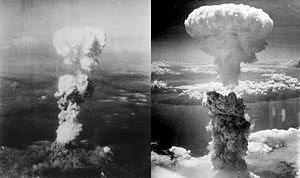Nuclear Power Dispute Over Hiroshima Memorial – OpEd
By JTW
By Gizem Erbaş
“Let us unite in prayer for peace, regardless of race or nationality.” This was the wish of thousands of people including the grandson former U.S. President Truman – who ordered the bombing of Hiroshima – gathered at the Hiroshima Peace Memorial ceremony. August 6 was the 67th anniversary of the Hiroshima disaster. During the Second World War, 67 years before this day, the United States conducted two atom bombings of Japanese cities; Hiroshima on August 6 and Nagasaki on August 9. These were the sole instances in which atom bombs were used on people, and due to their terrible effects nuclear weapons were never used again. Within two months after the Hiroshima bombing, approximately 140,000 people died because of the acute effect of the nuclear bomb. The disaster proved to the world why the use of nuclear power can be a threat for humankind.

Up to the present, eight countries – the U.S., UK, Russia, Pakistan, India, France, China and North Korea – have admitted their possession of nuclear weapons. As of 2012, there are 4,400 active nuclear warheads and 19,000 total nuclear warheads worldwide. Even though these weapons are maintained with high security measures and treaties to reduce and prevent the use of nuclear weapons–such as the Non-Proliferation Treaty–are ratified, the risk of a second Hiroshima disaster will continue to exist as some countries having nuclear weapons including Pakistan, India and Israel have not yet signed the relevant treaty. Ratification is also another issue yet to be resolved.
At the Hiroshima Peace Memorial ceremony, 50,000 people asked “for no more nuclear victims” amid rising anti-nuclear sentiment in post-Fukushima Japan. Prime Minister Yoshihiko Noda said in his speech that “the government has a basic policy of making Japan free from dependence on nuclear power generation.” The Fukushima accident triggered by a tsunami and earthquake showed the danger of nuclear energy, even if it is used for peaceful objectives. As a result of radiation leakage, two hundred thousand people were evicted from their homes, and the nuclear risk still cannot be prevented. In addition, it is estimated that the radiation reached the shore of Iceland. However, in today’s world, nuclear energy seems like one of the most beneficial energy resources. While states aim to increase or establish nuclear power plants, citizens of those countries express their concern about nuclear energy.
In conclusion, nuclear power is considered one of the fundamental energy resources for the future. As of July 2012, 435 nuclear power plants in 31 countries are in operation. In addition, 62 plants in 14 countries are under construction. The use of nuclear weapons was banned by international treaties in times of war, yet as long as there are nuclear weapons remaining, the risk for human life will remain. Second, in times of peace, the use of nuclear energy may be a risk for human life in the example of Fukushima. Nuclear energy is a necessity of the future energy demand, but also a big burden as states should take the responsibility of providing the nuclear power as safely as possible for human life.

Hogwash. Nuclear cannot be an integral part of our energy future. It is too expensive, contaminates at every step in the nuclear fuel cycle, is unreliable as water needed for cooling the reactor and spent fuel pools is increasingly in too short supply or too hot in temperature to perform the needed cooling, the technology is antiquated and inefficient, and from a climate change concern one must consider this: for the whole of 10 or 20 or more years that a new reactor would be under construction….through all of those years carbon will be pumped into the atmosphere as a result of the construction, concrete, etc.., and another whopping dose of carbon from the mining and processing of uranium. All that carbon into the atmosphere decades before a nuclear plant generates one watt of electricity. Our planet cannot afford to drink the Kool-Aid that nuclear proponents dish out. Nuclear has been a boondoggle from the beginning – except for some “well performing” nuclear weapons.